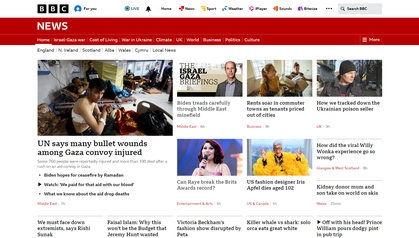Stay Notified with the Latest Reports from DW News
Stay Notified with the Latest Reports from DW News
Blog Article
How News Online Is Changing the Means We Consume Information
In the digital age, the usage of information has actually gone through a seismic shift, providing both extraordinary opportunities and complicated difficulties. The immediacy of online information platforms allows individuals to accessibility details instantly, tailored to suit individual interests through sophisticated formulas. Nonetheless, this comfort elevates crucial inquiries concerning the dependability of resources and the potential for bias, as curated web content can unintentionally develop resemble chambers. As we navigate this developing landscape, it comes to be important to explore just how these changes affect our understanding of the globe and the implications for educated decision-making in culture.
Instant Access to Information

With the arrival of digital modern technology, the method we eat news has undertaken a significant makeover, using instant access to info at our fingertips. The immediacy of electronic information indicates that tales can be reported and disseminated nearly immediately, eliminating the time lag that was intrinsic in print and television media.
On the internet information electrical outlets have actually profited from this capability by developing committed applications and websites that provide damaging news notifies straight to our gadgets. This constant flow of details makes sure that the general public stays involved and mindful of current affairs, promoting a much more educated society. Furthermore, the accessibility of digital news throughout numerous tools-- smartphones, tablets, and computers-- has made it practical for target markets to access news anytime and anywhere.
Nonetheless, this quick circulation likewise presents obstacles, such as the possibility for misinformation to spread quickly. The pressure to publish swiftly can sometimes endanger precision, underscoring the need for rigorous fact-checking and responsible journalism in the electronic age.
Customized Content Distribution
Customizing news intake to private preferences has actually come to be a defining feature of the electronic media landscape. With the introduction of innovative formulas and data analytics, information platforms are significantly able to provide web content that straightens carefully with customers' rate of interests and reading routines. This customization not just boosts user involvement however additionally ensures that customers are exposed to one of the most prompt and appropriate details.
The process typically includes collecting data on the customer's past communications, such as articles check out, subjects of rate of interest, and time spent on various material types. dw news. This information is after that examined to forecast the user's choices and to curate a customized information feed. Because of this, customers obtain a streamlined circulation of details that matches their distinct rate of interests, therefore producing an extra gratifying and efficient news usage experience
Moreover, tailored content delivery has significant implications for media companies. By creating more targeted material, these firms can increase reader retention and interaction, bring about potentially higher marketing earnings. However, this technique additionally raises problems about echo chambers, where users may only encounter perspectives that strengthen their current ideas. Therefore, striking a balance in between customization and varied web content direct exposure stays a read crucial challenge for the market.
Interactive and Involving Styles
Accepting interactive and appealing styles has actually transformed the method audiences consume information online, offering a more immersive and participatory experience. Interactive aspects such as clickable infographics, video explainers, and real-time information assimilation assist in a deeper understanding of complicated subjects, changing passive visitors into energetic individuals in the information narrative.
VR provides an unequaled degree of engagement, carrying individuals right into a substitute atmosphere where they can experience tales first-hand. These formats are particularly effective in covering breaking news and unraveling events, providing a front-row seat to global incidents.
The Role of Social Network
Social media site's prevalent impact has actually redefined the landscape of information intake, changing it into a much more democratized and interactive experience. Platforms such as Twitter, Facebook, and Instagram have actually come to be main centers for information circulation, permitting individuals to gain access to info instantaneously and share it extensively. This access makes it possible for people to not only consume information yet additionally engage with it, fostering a space where varied voices can contribute to the discussion.

Social media site's algorithm-driven personalization tailors the information experience to private preferences, potentially raising interaction. Nevertheless, this can likewise create resemble chambers, where individuals are exposed mostly to point of views that strengthen their existing ideas. In spite of this, the role of social media sites in news consumption stays pivotal, bridging the gap between details providers and target markets, and reshaping how individuals engage with news in the electronic age.
Difficulties of Online News
While the electronic improvement of information shipment provides unmatched accessibility and immediacy, it also presents substantial obstacles that make complex the landscape of info intake. One key problem is the proliferation of misinformation and disinformation, which can spread swiftly across digital systems. This offers problems for consumers in critical reliable resources from those that are less dependable, potentially bring about extensive helpful site false impressions.
The speed at which information is provided online usually focuses on timeliness over accuracy. In the race to be initially, some outlets might publish unproven details, which can later prove to be inaccurate, eroding public count on media. Furthermore, the echo chamber impact, helped with by algorithms that tailor material to customer preferences, can enhance existing predispositions and limit exposure to varied perspectives.
Money making techniques better complicate the landscape. The reliance on marketing earnings incentivizes sensationalism and clickbait, eclipsing substantive journalism. Paywalls, while essential for financial sustainability, can limit access to quality news, aggravating information inequality.
Conclusion
The improvement of information usage with online systems has considerably altered info gain access to and involvement. Instantaneous accessibility, customized web content, and interactive formats improve the customer experience, while social media magnifies reach and immediacy. Regardless of these improvements, challenges such as misinformation and echo chambers present substantial concerns, potentially click here for more deteriorating count on trustworthy resources and restricting direct exposure to varied perspectives. A well balanced strategy is important to harness the benefits of on the internet news while alleviating its inherent risks.

As an outcome, customers obtain a structured circulation of info that matches their special rate of interests, thus producing a more efficient and gratifying news consumption experience.
Systems such as Twitter, Facebook, and Instagram have actually ended up being central hubs for information circulation, enabling users to accessibility details immediately and share it widely. Regardless of this, the duty of social media in news intake stays critical, linking the space between details suppliers and audiences, and improving just how individuals interact with information in the digital age.
Report this page